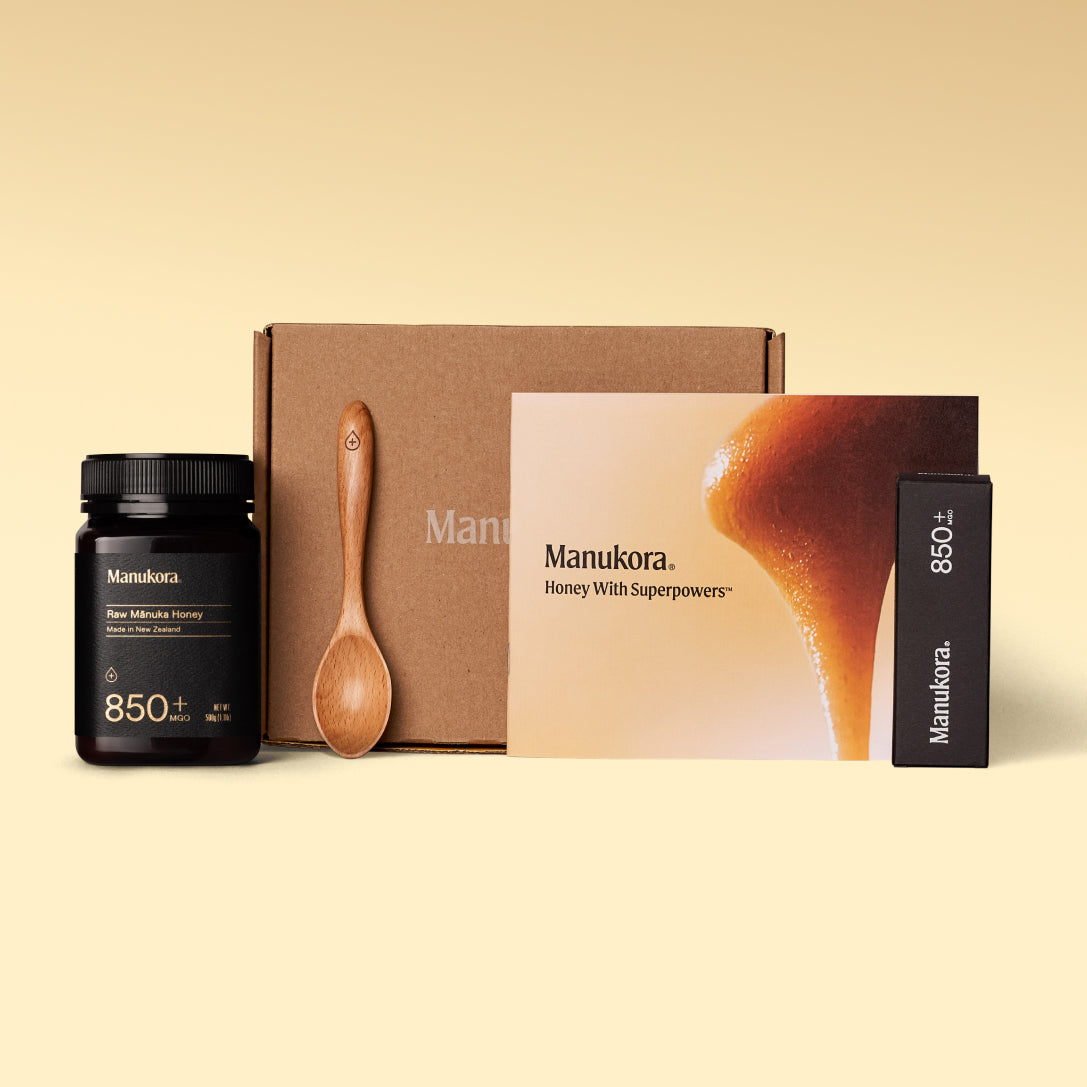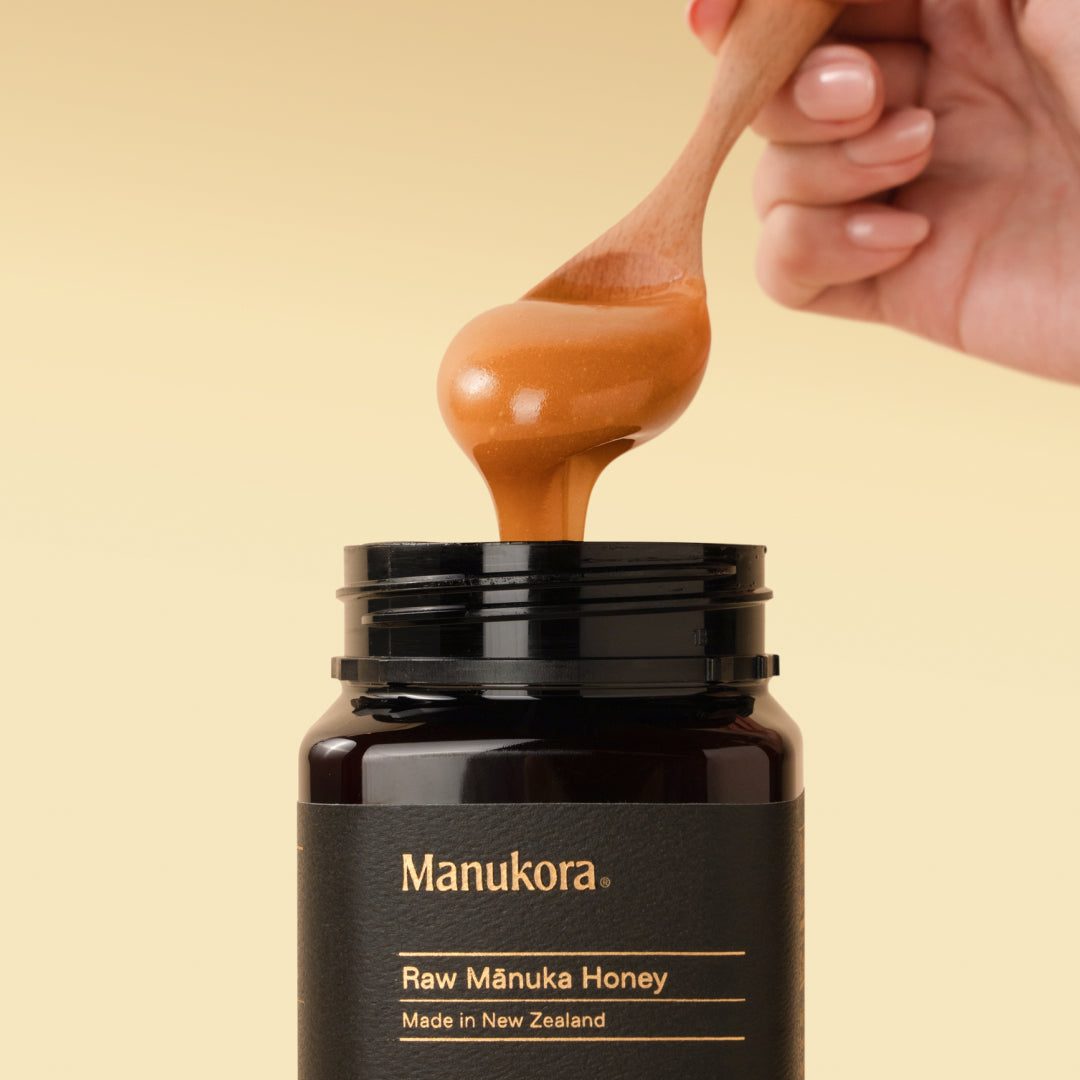Executive Summary:
-
Manuka honey is a great keto-friendly sweetener when used in moderation.
-
Individuals following the ketogenic diet can enjoy the natural compounds in Manuka.
-
There are approximately 17g of carbohydrates in 1 tbsp of Manuka honey.
-
Manuka honey can support keto dieters as a natural sweetener option.
Manuka Honey and the Ketogenic Diet: A Perfect Match?
Manuka is a world-renowned honey native to New Zealand that is best known for its robust nutritional value and delicious rich flavor. Meanwhile, the ketogenic diet is a popular dietary regime among many health-conscious individuals.
Individuals following the ketogenic diet consume high-fat and low-carbohydrate foods, which can promote weight loss and other health benefits. So, can Manukora's Manuka honey be part of this diet? Below, we explore the compatibility between Manuka and the ketogenic diet and how to integrate the two into a healthy lifestyle.
The art of ketogenic eating isn't about eliminating all carbohydrates, but rather being selective about which ones you include. Quality and portion size matter just as much as the numbers.
What Makes Manuka Honey Unique?
Manuka is a nutrient-dense honey containing a plethora of antioxidants, prebiotics, and antibacterial components. Its most distinctive compound is methylglyoxal (MGO), which is unique to the Manuka tea tree. Expect rich caramel and floral tones with each mouth-watering taste of this creamy liquid gold, adding a delightful, sweet addition to any meal.
In comparison with regular honey, Manukora's Manuka honey is unique and of high caliber due to its:
-
High MGO rating (contains robust antibacterial properties)
-
Dark color and thick and creamy texture
-
Caramel and toffee flavor with floral notes
-
Hive locations in the remote forests of New Zealand
-
Creation using the Art of Ethical Beekeeping
-
Rigorous third party lab testing and grading
-
Leptosperin contents
-
Certification of being glyphosate residue-free
It's also 100% raw and a monofloral honey, meaning our bees solely collect nectar from the Manuka tea tree. Overall, we'd argue that Manukora Manuka honey far exceeds regular honey varieties with its premium quality and unique natural compounds. There's just no other honey like it!
Understanding the Unique Properties of Different Manuka Honey Grades
Each Manukora Manuka honey grade offers a distinctive flavor profile and MGO concentration:
|
MGO Grade |
Carbs per Tbsp |
Flavor Profile |
Use For |
|
600+ |
~17g |
Milder, balanced sweetness |
Daily immune support |
|
850+ |
~17g |
Medium intensity, deeper notes |
Immune and digestive support |
|
1000+ |
~17g |
Most robust, complex flavor |
Advanced wellness support |
While the carbohydrate content remains consistent across grades, the flavor intensity increases with higher MGO levels, potentially allowing keto followers to use less for the same flavor impact.
The Keto Diet Basics
The ketogenic diet focuses on eating low-carb and high-fat foods, along with a moderate amount of protein. This causes the body to go into ketosis, which means it burns fat for energy. In turn, many use the keto diet for weight loss.
So, do carbs have a place in the keto diet? Some do!
Complex carbohydrates such as kumara, green vegetables, and whole-grain rice provide a slow release of glucose. This is a long-lasting energy source that doesn't cause an insulin spike, which is important when following a low-carb diet, such as the keto diet.
When following the keto diet, simple carbohydrates such as potatoes, cake, white rice, and pasta are to be restricted. These increase blood sugar levels quickly, and any surplus of glucose will be stored as body fat. Thus, it's vital to consume complex carbohydrates to remain in ketosis while also focusing on a nourished and healthy approach.
Ketogenic eating isn't just about counting carbs - it's about being intentional with your choices. Including small amounts of natural sweeteners like Manuka honey can make the lifestyle more sustainable when used mindfully.
Common Sweeteners on Keto: How They Compare
When following a ketogenic diet, choosing the right sweetener matters. Here's how Manuka honey compares to other common options:
|
Sweetener |
Carbs per Tsp |
Glycemic Index |
Natural/Artificial |
Special Properties |
|
Manuka Honey |
~5.7g |
55-65 |
Natural |
Contains MGO, antioxidants, prebiotics |
|
Regular Honey |
~5.8g |
58-65 |
Natural |
Simple sweetness without Manuka's compounds |
|
Maple Syrup |
~4.5g |
54 |
Natural |
Contains some minerals |
|
Coconut Sugar |
~4g |
35 |
Natural |
Contains some minerals |
|
Stevia |
0g |
0 |
Natural extract |
May have aftertaste |
|
Erythritol |
0g |
0 |
Natural sugar alcohol |
May cause digestive discomfort in some |
|
Monk Fruit |
0g |
0 |
Natural extract |
Often mixed with other sweeteners |
While zero-carb sweeteners are common on keto, some practitioners prefer using small amounts of natural options like Manuka honey for their flavor complexity and natural compounds, while being mindful of serving sizes.
Manuka Honey in a Ketogenic Diet
There are different versions of the ketogenic diet, but generally, eating around 50 grams of carbohydrates is recommended. That includes the carbohydrates that come from sugars, such as in honey. Manuka honey contains approximately 17g of carbohydrates per tablespoon, which fits in well into the daily amount.
Processed sugars are to be avoided while on a ketogenic diet, as they can raise blood sugar and insulin levels. However, Manuka honey, such as Manukora Manuka honey, can be used as a sweetener in keto-friendly recipes or in tea to improve the taste and provide additional nutrients.
Benefits of Manuka Honey for Keto Dieters
Following a ketogenic diet can lead to a depletion of nutrients because of the limitations of the food variety. It is common for keto-dieters to become deficient in vitamins and minerals such as vitamin B. This makes Manuka honey a perfect addition to complement a well-rounded keto approach.
It can be a natural source of energy, provide antioxidants, and support vitality. By far, the health benefits of Manuka honey outweigh the need to cut it out of a ketogenic diet.
Practical Tips for Incorporating Manuka Honey into a Keto Diet
Here are 3 tips to consider when integrating honey into a ketogenic lifestyle:
1. Maintain portion control.
Restrict the intake of Manuka honey to only a couple of tablespoons per day, depending on your specific carbohydrate limit. Instead of drizzling it all over the food, be sure to measure the amount. Using tablespoons as a portion size can make everything easier to track.
2. Be creative with your recipes.
There is no need to eat boring, plain food while on a ketogenic diet. Use Manuka sparingly as a sweet dressing over fresh salads or drizzled over roasted vegetables. A Manuka honey avocado dressing is perfect for keto dieters, as avocados are high in healthy fats. Even adding a bit of Manuka to a cup of lemon tea is a great sweet treat.
3. Listen to your body.
It is important to listen to the body while on a ketogenic diet to ensure optimal overall health and well-being is maintained. If there are signs of feeling sluggish, dizzy, or headaches and an increased heart rate are occurring, blood sugar levels may be too low.
Integrating Manuka honey into a keto diet will aid in increasing blood sugar levels and provide the body with the nutrients it needs to thrive. Overall, a bit of this golden nectar can complement a well-balanced, healthy ketogenic lifestyle.
Frequently Asked Questions About Manuka Honey on Keto
Will Manuka honey kick me out of ketosis?
It depends on the amount consumed and your personal carbohydrate threshold. A small amount (1 teaspoon) contains about 5.7g of carbs, which can fit within many keto macros when carefully tracked. Consuming larger amounts may affect ketosis for some individuals.
How much Manuka honey can I have on keto?
Most keto practitioners aim to stay under 20-50g of carbs daily. A teaspoon of Manuka honey (about 5.7g of carbs) or a tablespoon (about 17g of carbs) should be counted within your daily carb allowance. For strict keto, limit to 1 teaspoon occasionally.
Is Manuka honey better than artificial sweeteners on keto?
While artificial sweeteners contain zero carbs, Manuka honey offers natural compounds and a complex flavor profile that many prefer. The choice depends on your personal priorities - zero carbs versus natural ingredients with some carbs.
When is the best time to consume Manuka honey on keto?
Many keto followers find that consuming Manuka honey before or after physical activity works best, as the body can utilize the carbohydrates more efficiently during these times. Others prefer saving it for special recipes where its unique flavor is showcased.
Can I use Manuka honey during keto adaptation?
During the initial adaptation phase (first 2-4 weeks), it's generally recommended to keep carbs at a minimum. Consider waiting until you're fat-adapted before incorporating Manuka honey, and then introduce it gradually in small amounts.
Add Manuka Honey to your Ketogenic Lifestyle Today!
New Zealand-made, Manukora Manuka honey is a high-quality option for any keto-friendly pantry. When used in moderation in alignment with the daily carbohydrate limit, keto-dieters can easily have a delicious sweet source of nutrients while maintaining a state of ketosis.
For an added touch of wellness throughout your ketogenic journey, consider incorporating ethically produced, raw Manukora Manuka honey. As the perfect option for a keto-friendly sweetener, this range of premium Manuka honey makes going low-carb so much more enjoyable both taste and energy-wise!
Sources
What Is Manuka Honey? Its Benefits & What Makes It Special | Manukora
What To Look For When Buying Manuka Honey -- Manukora
Manukora's Ethical Beekeeping Standard
Manuka Honey vs. Raw or Regular Honey: What's the Difference? -- Manukora
MGO 850+ Manuka Honey | Manukora
How Much Sugar Can You Have on the Keto Diet? This Expert Explains
Slow and fast carbohydrates: What's the difference? | Atkins Low Carb Diet.


















